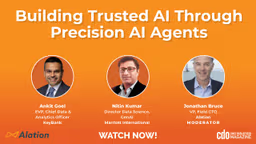Opinion & Analysis
A Chief Data Officer’s Guide to Leading Strategic Change with GenAI
Written by: Martin Brunthaler | Co-founder and CTO at Adverity
Updated 2:50 PM UTC, Tue March 12, 2024

More data professionals have been gaining a C-title, but greater respect and responsibility have brought new challenges. While they no longer need to champion the benefits of insight-driven company culture, implementation is proving difficult. As mentioned in an AWS report — almost 70% of Chief Data Officers (CDOs) said cultural initiatives absorb most of their time and half admit that lacking the right culture is making it hard to hit key business objectives.
Tackling these challenges won’t be quick or simple, with multi-faceted efforts required to obtain stronger buy-in and boost data skills across organizations. But there is potential for one fast-developing innovation to help them along the way — generative AI (or GenAI).
Stuck in the middle: What’s keeping CDOs locked on operations?
In tandem with their rise through the executive ranks, data leaders have seen their role go through several iterations, indicative of their rising importance. According to Deloitte’s latest global CDO research, this has meant a shift from the original “Compliance CDO” to today’s “Strategic CDO” — who should be enabling business success by fueling effective individual and collective data use.
However, the study also shows that a majority of CDOs are still stuck performing middling-level duties, fulfilling the role of the “Operational CDO.” Although 61% aspire to focus on creating and applying data strategies, many (25%) spend a disproportionate amount of their time on operational tasks, including managing data, tweaking technology solutions, and working to embed a data-centric mindset. Or, in short, running the data show, while trying to get the rest of their organization involved.
Although there are various potential reasons for this, data literacy seems to crop up tellingly often — not only listed among the top priorities in Deloitte’s survey but also cited as one of the biggest CDO pain points in similar Gartner research, ranking just a few rungs below resistance to change. As is frequently the case with any transformative initiative, it looks like a lack of know-how and understanding is resulting in low enthusiasm, and therefore slow adoption.
Training will, of course, be integral to addressing this problem. In particular, CDOs must ensure skills development offers tailored support that allows each employee to hone the knowledge and abilities needed for better data-fuelled activity, in line with their specific responsibilities.
But to cultivate a lasting culture of confident and consistent data use, it will also be vital to equip workers with tools that enable them to easily wield data for themselves, and that is where GenAI comes in.
AI autonomy — Power to the people
Intelligent deep-learning models have much broader applications than just scaling up content generation. Fundamentally designed to create novel outputs from varied inputs, smart tools are equally well-suited to analysis, with the added benefits of enhanced real-time data processing power and multi-tasking ability.
As recognition of this natural pairing has grown, so have the number of tools harnessing GenAI to offer self-service features that make data handling simpler to more people, including those without in-depth expertise.
At the starter level, we are seeing the emergence of innovative AI-powered assessment tools with vast capacity to help democratize analytics. Able to work from straightforward natural language prompts, these intelligent solutions can swiftly run large-scale SQL queries, pull together the most useful data, and share it with users through accessible visualizations.
From the CDO perspective, the benefits of such tools are twofold. Firstly, ensuring employees across departments can resolve their queries will make it possible to finally start stepping back from manning operations, and spend more time developing data strategy. Secondly, giving users the scope to answer key data-based questions (without having to wait for analysts/specialists) will build favorability and personal confidence, both of which are vital initial steps toward establishing a healthy data culture.
Cultivating a new crop of decision scientists
Transforming company culture is no small or short task. Typically, workers who feel they can constructively contribute to change are less likely to push against it and more willing to play an active role in fuelling successful rollouts. However, to ensure the longevity of budding pro-data attitudes and practices, this positivity also needs to be consistently reinforced.
Again, there is significant room for GenAI to assist here by empowering users to incrementally integrate data use into everyday workflows. As well as fielding requests, increasingly sophisticated solutions now boast features that help unlock greater efficiencies by enabling users to perform basic analysis independently; including inputting varied data and generating summaries of top-level insight.
In addition to saving crucial time for CDOs, equipping cross-company users with the ability to generate basic reports will remove barriers to ongoing data activation, allowing them to obtain and apply relevant information, as part of business as usual.
Marketing teams, for instance, can efficiently access and analyze data without having any specialist coding experience, saving valuable time and enabling them to prioritize high-level strategic tasks.
Adding further depth to these capabilities, the next generation of data assistants is tapping GenAI smarts to offer agile transformation possibilities. Allowing individuals to define precisely how datasets are formatted in line with their unique needs and creating bespoke code to order.
Many of the user-friendly solutions also provide play-by-play implementation walkthroughs, making it much easier for users to quickly get the custom data they require and start using it, building their proficiency and positivity over time.
Moreover, reduced time to insight and broader data activation will ultimately lead to greater efficiency across organizations. As well as preventing valuable data expertise from being tied up with manual data wrangling and coordinating transformations, streamlined data processes will pave the way for smarter insight-backed decision-making as standard.
In addition, the ability to get relevant insights delivered in the right format will also give individuals more freedom and time to experiment. In turn, this puts less pressure on the need to move on instantly if activities are not immediately producing the expected results.
For CDOs, this means the end result will not only be the completion of their mission to facilitate data-enhanced working but also elevated productivity and innovation that illustrates their tangible worth to CEOs, CIOs, and CFOs. This bolstering will win them critical support for future data and analytics initiatives.
CDOs are seeing their horizons expand from acting as “Chief Data Caretakers” to wielding influence and control over how information is used within their companies. However, validating their senior status is going to call for an enhanced ability to exercise control and realize visions of data-augmented culture.
Alongside taking the lead on raising team-wide data maturity by honing core skills, it will be critical to secure support from the entire workforce by enabling all employees to experience tangible proof of the value data brings. In this, GenAI is set to offer a key starting point.
About the Author:
Martin Brunthaler is Chief Technology Officer at Adverity. He is responsible for executing Adverity’s technological vision and strategies, as well as ensuring clients are utilizing the full potential of the platform. Before co-founding Adverity, Martin was CTO and Co-founder at two European technology start-ups and has extensive experience across multiple industries including ecommerce, media, and mobile.





